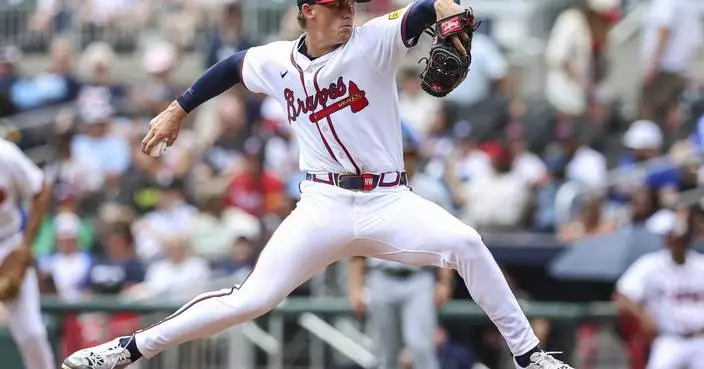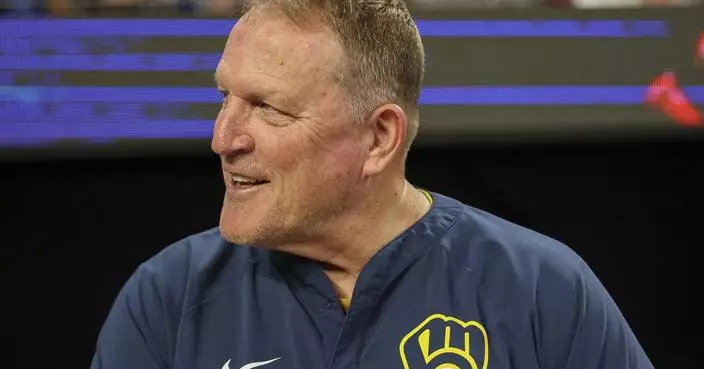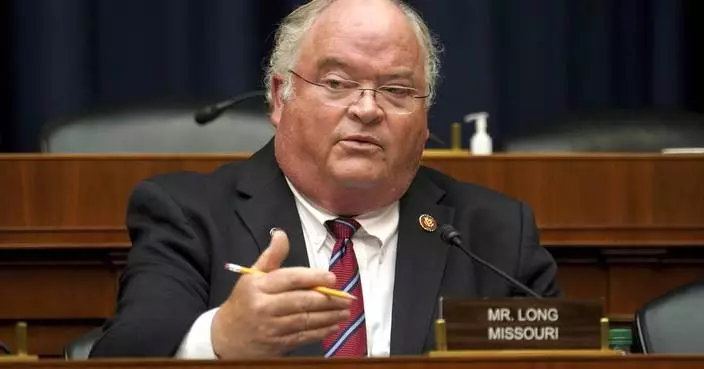Japan's Emperor Akihito has devoted his 30-year reign to making amends for a war fought in his father's name, while adapting the 1,500-year-old monarchy to draw the Imperial Family closer to the public.
Whether kneeling beside Empress Michiko to speak intimately with disaster victims, or reciting his own poetry, Akihito has won deep affection among his people.
The 85-year-old emperor's true feelings are impossible to know, but his nuanced public comments and insights from his classmates show him to be a determined man open to new ideas and keenly aware of his duties.
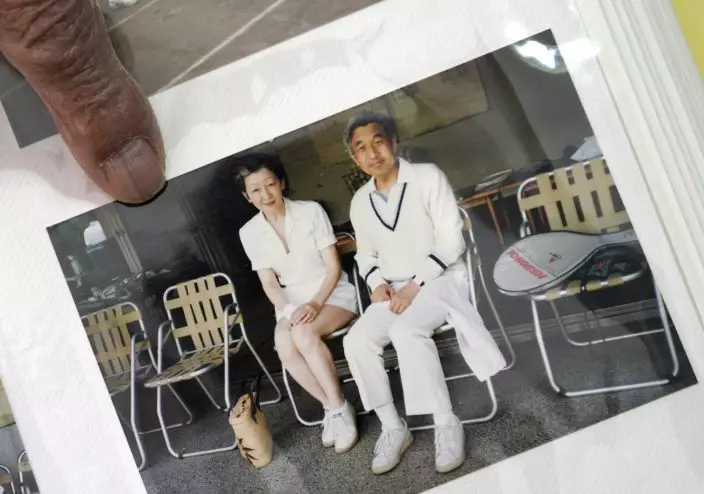
In this Feb. 3, 2019, photo, Kazuo Oda, a retired trading house executive and longtime tennis friend of Emperor Akihito, shows his photo of Akihito and Empress Michiko as they play tennis during an exclusive interview with the Associated Press in Tokyo. Akihito’s Heisei era will end when he abdicates on April 30 in favor of his elder son, 58-year-old Crown Prince Naruhito, beginning a new, as yet unnamed era. (AP PhotoEugene Hoshiko)
Kazuo Oda, a retired trading house executive and longtime tennis buddy of Akihito's, describes his friend as "extremely earnest."
"I think he has learned how to put himself into other people's shoes, and that's where his activities as emperor, such as his trips to pray for the war dead and visits to disaster victims, are coming from," Oda said in a recent interview with The Associated Press.
"He would never do anything irresponsible, and at the same time he is so considerate to other people."
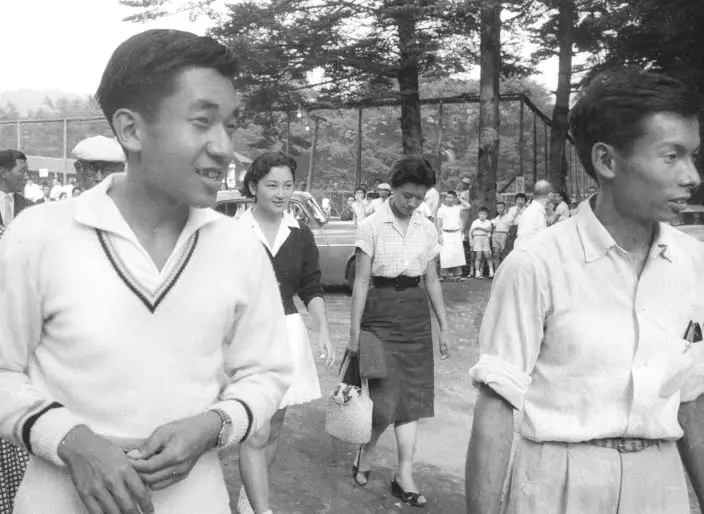
In this August 1958, photo, then Crown Prince Akihito, left, walks with Michiko Shoda, second from left, who married Akihito later, and Akihito's friend Kazuo Oda, right, at a tennis court in Karuizawa, northwest of Tokyo. At his advanced age, Akihito no longer plays tennis as often as he used to. He last played with Oda two years ago. Emperor Akihito has devoted his 30-year reign to making amends for a war fought in his father’s name, while adapting the 1,500-year-old monarchy to draw the Imperial Family closer to the public. (Kyodo News via AP)
Akihito's Heisei era will end when he abdicates on April 30 in favor of his elder son, 58-year-old Crown Prince Naruhito, beginning a new, as yet unnamed era.
The emperor cited his deteriorating health as his reason for stepping aside. While his official duties have been scaled back somewhat, he still receives visiting dignitaries, attends ceremonies and makes official visits. Inside the palace, he also performs private rituals of Shintoism, the indigenous religion intertwined with Japan's imperial family.
At his advanced age, Akihito no longer plays tennis as often as he once did. He last played with Oda two years ago. To keep fit, he Akihito reads a book while sitting straight, with his legs tucked beneath him in traditional "seiza" style, for an hour daily, Oda says.
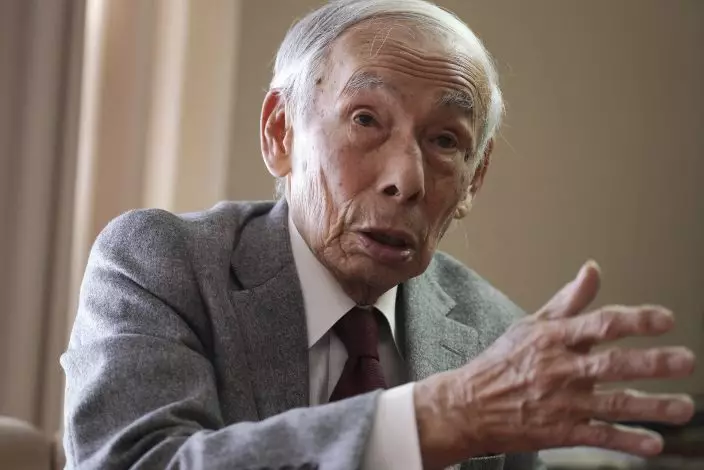
In this Feb. 3, 2019, photo, Kazuo Oda, a retired trading house executive and longtime tennis friend of Emperor Akihito, speaks during an exclusive interview with the Associated Press in Tokyo. Akihito’s Heisei era will end when he abdicates on April 30 in favor of his elder son, 58-year-old Crown Prince Naruhito, beginning a new, as yet unnamed era. (AP PhotoEugene Hoshiko)
Akihito assumed the throne in January 1989 after the death of his father Hirohito, the long-serving emperor whose reign spanned World War II and Japan's postwar economic recovery.
At the time Hirohito was born, he was still considered a deity, though he renounced that status with Japan's surrender.
Akihito has enjoyed widespread respect and sympathy as a politically neutral figurehead.
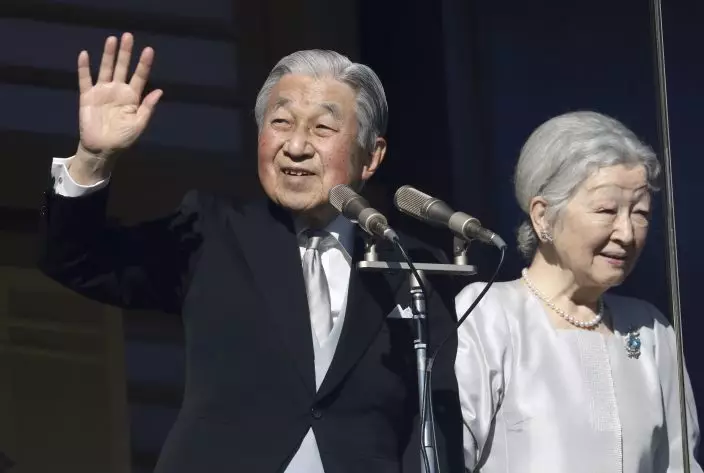
FILE - In this Jan. 2, 2019, file photo, Japan's Emperor Akihito and Empress Michiko greet to well-wishers from the bullet-proofed balcony during his New Year's public appearance with his family members at Imperial Palace in Tokyo. Akihito has devoted his 30-year reign to making amends for a war fought in his father’s name, while adapting the 1,500-year-old monarchy to draw the Imperial Family closer to the public. Akihito’s Heisei era will end when he abdicates on April 30, 2019 in favor of his elder son, 58-year-old Crown Prince Naruhito, beginning a new, as yet unnamed era. (AP PhotoEugene Hoshiko, File)
But his frequent expressions of hope that Japan has taken to heart lessons from World War II have been seen by many Japanese as a form of subtle resistance toward efforts by Prime Minister Shinzo Abe's hawkish government to expand the country's military role.
Oda first met the emperor when, as a junior high school student some 70 years ago, he tagged along with his elder brother to play tennis with Akihito on the palace grounds. Oda had never played, and mostly just watched the others. When a palace driver came to pick them up afterward, Akihito insisted that Oda sit on his lap so all five of the boys could fit in the car.
"That day I wrote in my diary that an unforgettable thing had happened. I went to have tea sitting on the crown prince's lap," Oda said. "He was like 'Let's go!' and very down-to-earth."
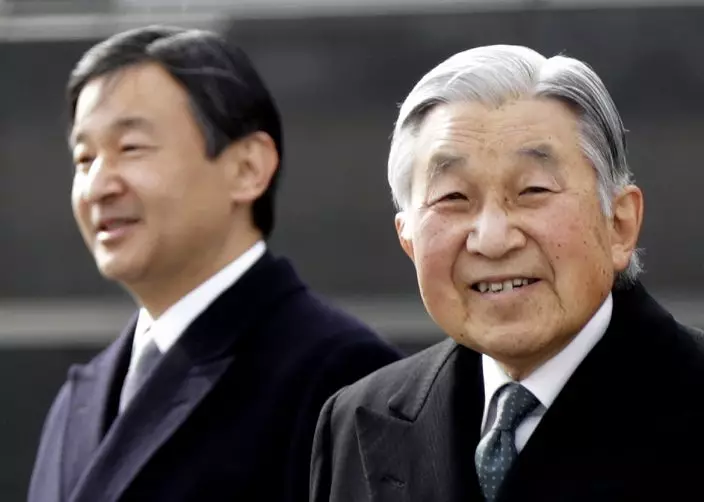
FILE - In this Jan. 26, 2016, file photo, Japan's Emperor Akihito, right, and Crown Prince Naruhito walk at Haneda international airport in Tokyo. Akihito has devoted his 30-year reign to making amends for a war fought in his father’s name, while adapting the 1,500-year-old monarchy to draw the Imperial Family closer to the public. Akihito’s Heisei era will end when he abdicates on April 30, 2019 in favor of his elder son, 58-year-old Naruhito, beginning a new, as yet unnamed era. (AP PhotoEugene Hoshiko, File)
"The emperor likes to socialize with people, though not in a glamorous way ... He wants to really get to know people and learn from them. He doesn't act like a typical monarch at all," Oda said. "To me, he is more like a big brother."
At the time Akihito was a bit chubby and tanned from swimming and other outdoor activities and his classmates affectionately called him "Chabu," short for the cute, pig-shaped ceramic containers used to burn mosquito coils, Oda said.
As a child, Akihito was aware that living aloof from the rest of the world in his palace he had to study others to achieve his aims. Playing tennis allowed him to meet a variety of people from well-to-do families, including, most importantly, the young flour milling heiress who became his wife, Michiko Shoda.
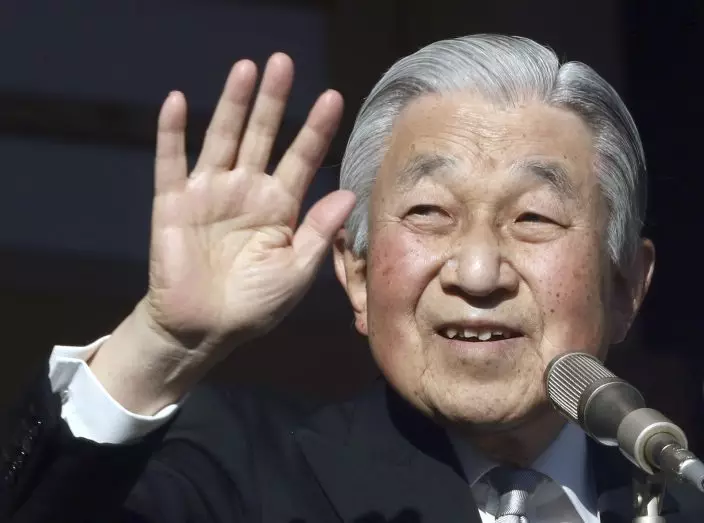
FILE - In this Jan. 2, 2019, file photo, Japan's Emperor Akihito waves to well-wishers from the bullet-proofed balcony during his New Year's public appearance with his family members at Imperial Palace in Tokyo. Akihito has devoted his 30-year reign to making amends for a war fought in his father’s name, while adapting the 1,500-year-old monarchy to draw the Imperial Family closer to the public. (AP PhotoEugene Hoshiko, File)
"It may sound funny, but I believe tennis had the biggest influence in making the Emperor who he is," said Oda. "He said it helped him gain confidence."
Eventually, Oda became an informal go-between between Akihito and Michiko, a college-educated beauty whose father owned the Nissin Flour Milling Co.
Aug. 19, 1957, was the day of the famous "love match" between Michiko, who teamed up with a Canadian teenager, Bobby Doyle, to beat the Akihito-Oda pair on a court in the central Japanese resort town of Karuizawa.
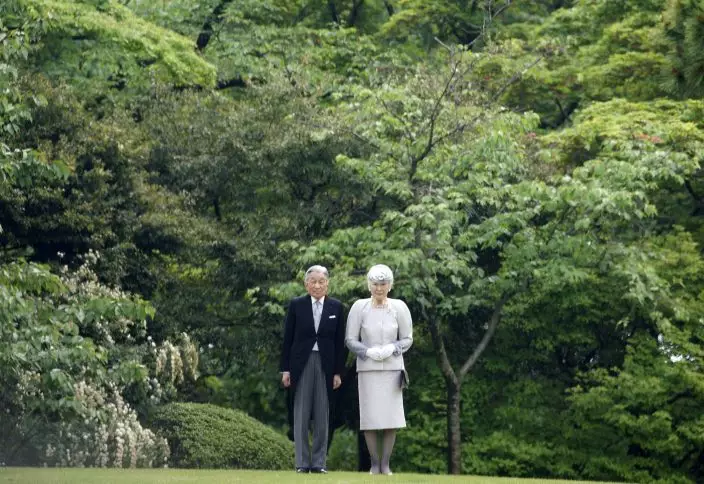
FILE - In this April 25, 2018, file photo, Japan's Emperor Akihito and Empress Michiko attend a spring garden party at the Akasaka Palace imperial garden in Tokyo. Akihito has devoted his 30-year reign to making amends for a war fought in his father’s name, while adapting the 1,500-year-old monarchy to draw the Imperial Family closer to the public. (AP PhotoEugene Hoshiko, File)
Akihito took the loss with good humor, praising Michiko's playing.
"I remember that very clearly," Oda said.
The two grew closer on the court and off, and palace officials eventually approved their marriage, despite some resistance to having the future emperor marry a Catholic-educated commoner.
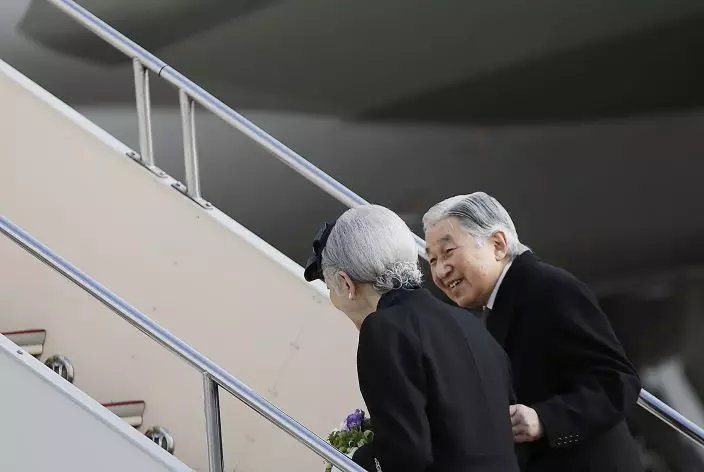
FILE - In this Jan. 26, 2016, file photo, Japan's Emperor Akihito smiles at Empress Michiko as they board their airplane to leave for the Philippines at Haneda International Airport in Tokyo. Japan’s Emperor Akihito has devoted his 30-year reign to making amends for a war fought in his father’s name, while adapting the 1,500-year-old monarchy’s traditions to draw the Imperial Family closer to the public. Akihito’s subtle public comments and insights from his classmates show him to be determined but also open to new ideas. He’s shown a keen awareness of his duties. (AP PhotoEugene Hoshiko, File)
Akihito and Michiko broke with tradition in many ways, especially in choosing themselves to raise their own children — Naruhito, Prince Akishino and former princess Sayako Kuroda, who lost her royal title when she married a commoner.
"It must have taken an enormous effort for (Akihito) to make those changes, breaking with the ancient traditions of the royal family," Oda said.
As emperor, Akihito has made unprecedented visits to the Philippines and other Pacific islands conquered by Japan that were devastated in fierce fighting as the U.S.-led Allies took them back. Though the emperor has avoided outright apologies, he has subtly stepped up his expressions of regret in carefully scripted statements on the war.
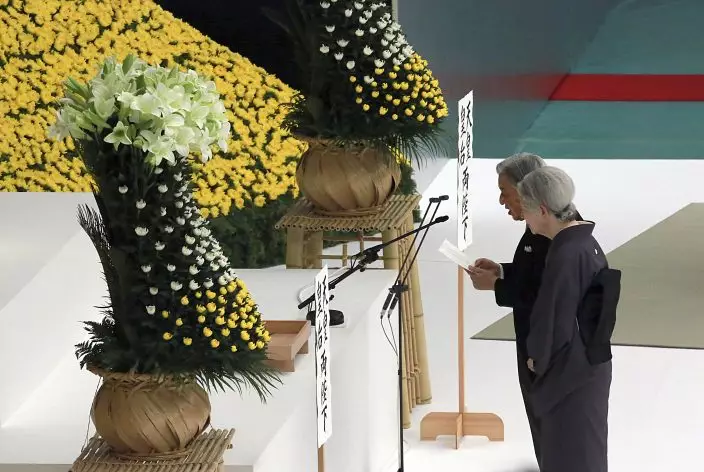
FILE - In this Aug. 15, 2018, file photo, Japan's Emperor Akihito delivers his remarks with Empress Michiko during a memorial service at Nippon Budokan martial arts hall in Tokyo. Japan’s Emperor Akihito has devoted his 30-year reign to making amends for a war fought in his father’s name, while adapting the 1,500-year-old monarchy’s traditions to draw the Imperial Family closer to the public. Akihito’s subtle public comments and insights from his classmates show him to be determined but also open to new ideas. He’s shown a keen awareness of his duties. (AP PhotoEugene Hoshiko, File)
"Even though the controversy was from his father's era, I believe (Akihito) has decided that it is his responsibility to pray for all the war dead, from civilians to American and British soldiers. The Emperor must have thought that he had to do it," Oda said.
Born on Dec. 23, 1933, Akihito was evacuated to the countryside in the closing days of the war as the Allies firebombed Tokyo. He was 11 when he heard his father announce Japan's Aug. 15, 1945, surrender on the radio.
"My childhood memories begin in 1937 when I was three years old ... and the war continued from then until August 1945. Thus, as I grew up, there was not a time without war," Akihito said in 1999, marking the 10th anniversary of his reign.
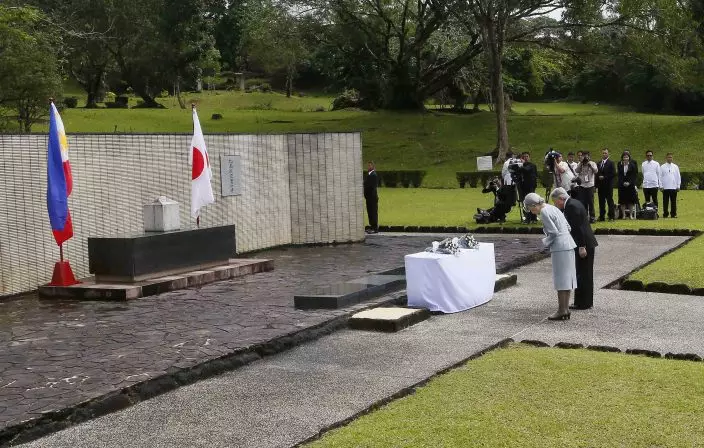
FILE - In this Jan. 29, 2016, file photo, Japan's Emperor Akihito and Empress Michiko bow to pay their respects to the Japanese Imperial Forces who died during WWII at the Japanese Memorial Garden at Cavinti, southeast of Manila, Philippines. Japan’s Emperor Akihito has devoted his 30-year reign to making amends for a war fought in his father’s name, while adapting the 1,500-year-old monarchy’s traditions to draw the Imperial Family closer to the public. Akihito’s subtle public comments and insights from his classmates show him to be determined but also open to new ideas. He’s shown a keen awareness of his duties. (AP PhotoBullit Marquez, File)
During the postwar U.S. occupation of Japan from 1945-52, he was tutored in English by Elizabeth Vining, a Quaker whose influence helped shape Akihito's independent thinking and his pacifist and democratic views, his friends say.
"It gives my deep comfort that the Heisei era is coming to an end, free of war in Japan," Akihito said, his voice trembling with emotion, at a news conference in December marking his 85th birthday.
Akihito has shown a special interest in Okinawa, the small southern islands where about 100,000 civilians lost their lives in the only ground battles inside Japan. Under U.S. occupation until 1972, the islands still are home to about half of the 50,000 American troops based in dozens of bases in Japan under a bilateral security pact.
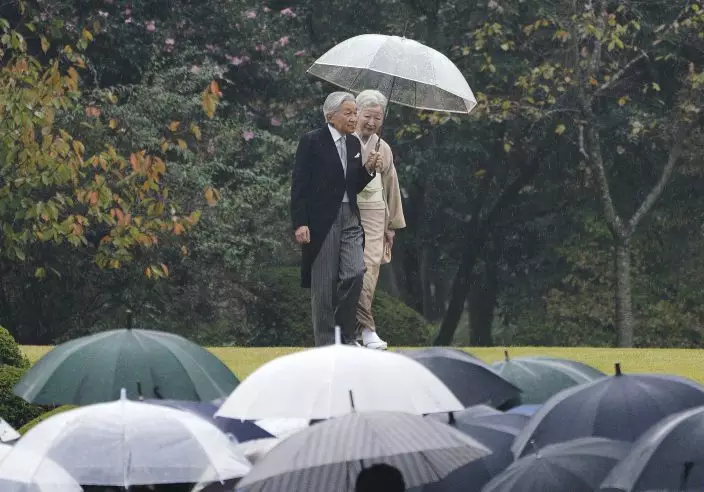
FILE - In this Nov. 9, 2018, file photo, Japan's Emperor Akihito and Empress Michiko walk down a hill to greet guests during the autumn garden party at the Akasaka Palace imperial garden in Tokyo. Japan’s Emperor Akihito has devoted his 30-year reign to making amends for a war fought in his father’s name, while adapting the 1,500-year-old monarchy’s traditions to draw the Imperial Family closer to the public. Akihito’s subtle public comments and insights from his classmates show him to be determined but also open to new ideas. He’s shown a keen awareness of his duties. (AP PhotoEugene Hoshiko, File)
Akihito was almost hit by a Molotov cocktail on a 1975 visit to Okinawa, where anti-emperor sentiment runs strong. But he and Michiko stuck with their schedule despite the attack and have returned to the islands 10 more times so far.
Oda said he hopes Akihito and Michiko might enjoy their retirement after his abdication, perhaps in scenic Karuizawa, where their romance began.
Using taxpayer dollars might be a problem, Oda said, but "My dream is to see the Emperor and Empress build a cute little cottage near that tennis court, where they first met, so they can visit and perhaps play a bit and then after that they can enjoy talking before a fireplace."
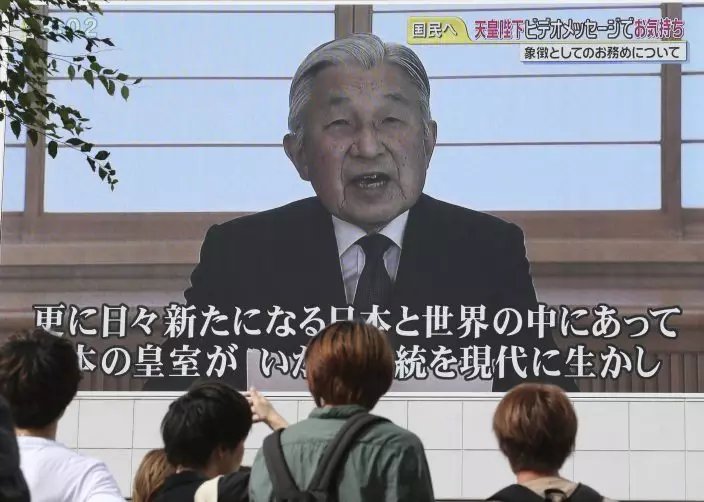
FILE - In this Aug. 8, 2016, file photo, pedestrian watch a screen displaying Japan's Emperor Akihito delivering a speech in Tokyo. The Japanese emperor, in a rare address to the public, signaled his apparent wish to abdicate by expressing concern about his ability to carry out his duties fully. Akihito’s Heisei era will end when he abdicates on April 30, 2019 in favor of his elder son, 58-year-old Crown Prince Naruhito, beginning a new, as yet unnamed era. (AP PhotoKoji Sasahara, File)
Follow Mari Yamaguchi on Twitter at https://www.twitter.com/mariyamaguchi
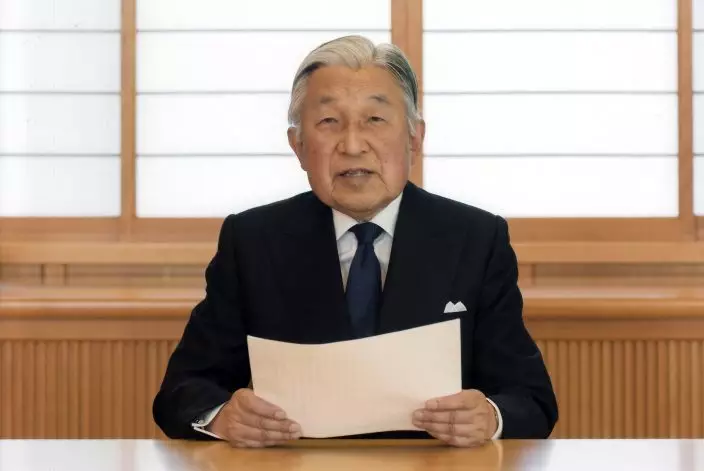
In this Aug. 7, 2016, file photo, provided by the Imperial Household Agency of Japan on Monday, Aug. 8, 2016, Japan's Emperor Akihito reads a message for recording at the Imperial Palace in Tokyo. Akihito expressed concern about fulfilling his duties as he ages in an address to the public in a 10-minute recorded speech broadcast on national television that was remarkable for its rarity and its hinted possibility that he may want to abdicate in a few years. Akihito’s Heisei era will end when he abdicates on April 30, 2019 in favor of his elder son, 58-year-old Crown Prince Naruhito, beginning a new, as yet unnamed era. (Imperial Household Agency of Japan via AP, File)
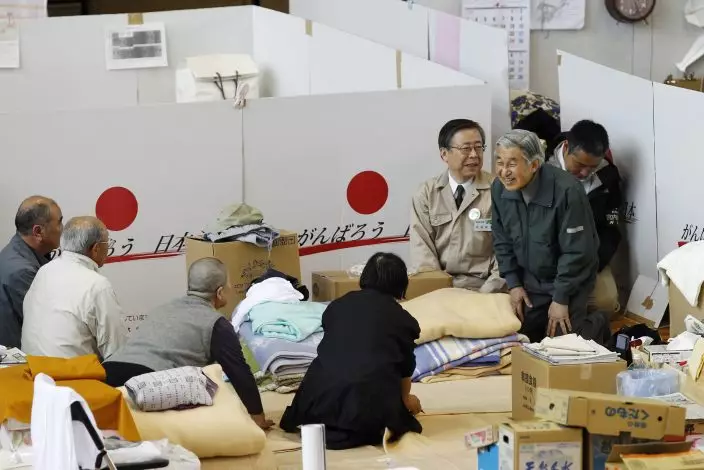
FILE - In this May 11, 2011, file pool photo, Japan's Emperor Akihito, right, talks to evacuees at a shelter for people who fled their houses because of radiation fear by the March 11 tsunami-crippled Fukushima Dai-ichi nuclear power plant in Fukushima, northeastern Japan. Japan’s Emperor Akihito has devoted his 30-year reign to making amends for a war fought in his father’s name, while adapting the 1,500-year-old monarchy’s traditions to draw the Imperial Family closer to the public. Akihito’s subtle public comments and insights from his classmates show him to be determined but also open to new ideas. He’s shown a keen awareness of his duties. (AP PhotoShizuo Kambayashi, File)




